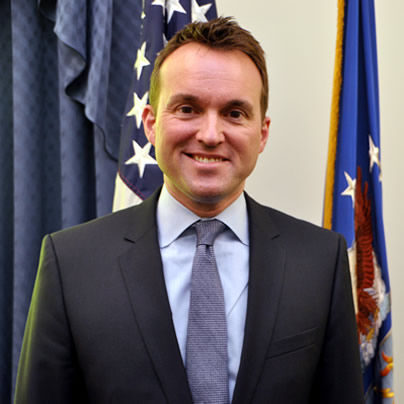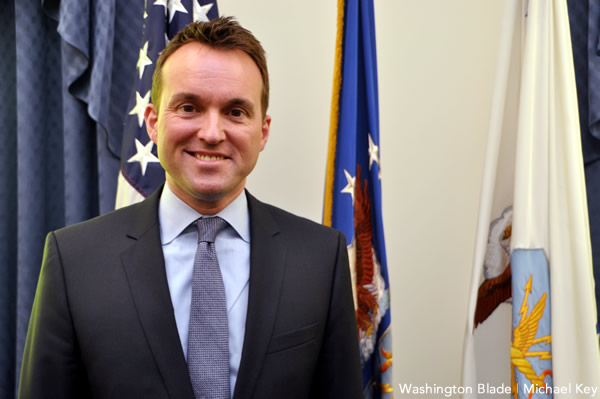Politics
Soaring at the Air Force
Under Secretary Fanning on his career and vision for an LGBT-inclusive military

After being bitten by the politics bug in 1988, a gay Dartmouth college student would abandon plans to pursue a career in architecture and instead move to D.C. where, years later, he would ascend the ranks to take on the second-highest civilian position in the U.S. Air Force.
It was the New Hampshire primary after eight years of Ronald Reagan that led Eric Fanning to shift his career trajectory to politics and policy.
“The campaign hooked me on politics. I found my way into an internship on the Hill and decided I wanted to come back,” Fanning said. “I got a great job on the House Armed Services Committee, which is not easy to do. I was very lucky to get that. The chairman of the committee, for whom I was research assistant, was, within 16 months, Clinton’s first defense secretary, so I was over here in the Clinton Pentagon. The path kind of wrote itself very early on.”
Fanning, 44, reflected on his career path and vision for an LGBT-inclusive Air Force during an interview with the Washington Blade in his office at the Pentagon on Wednesday — the first media interview he’s granted since the U.S. Senate confirmed him last month as under secretary of the Air Force by voice vote.
After his initial work on Capitol Hill, Fanning worked as special assistant to the Secretary of Defense, and associate director of political affairs at the White House. During the Bush administration, he worked for Business Executives for National Security, a D.C.-based think tank before joining the Commission on the Prevention of Weapons of Mass Destruction Proliferation & Terrorism.
Once President Obama assumed office, Fanning went to work as Deputy Chief Management Officer for the Department of the Navy and continued in that role until he was nominated in July for his role as Air Force under secretary. In that role as part of Air Force leadership, Fanning is responsible for affairs on behalf of the secretary of the Air Force, including organizing, training and equipping the service. Fanning, who’s single, lives in Logan Circle and works at the Pentagon.
Throughout his service in the government, Fanning has witnessed the enactment of “Don’t Ask, Don’t Tell” in 1993 as well as the ban on openly gay service members being lifted after President Obama signed repeal legislation in December 2010.
“‘Don’t Ask, Don’t Tell was implemented when I got here,'” Fanning said. “That wasn’t a particularly fun experience listening to the senior generals and admirals talk about those issues — now it was 20-plus years ago. It made this last round more rewarding just to see the change in the attitudes in the senior uniform leadership.”
Although he said he’s never felt like he’s been discriminated against while working at the Pentagon, Fanning said working for an institution that would have discharged him for being openly gay if he had served on the uniform side was “challenging” and he was on pins and needles as legislation to repeal the law met obstacles in Congress.
“I left the Pentagon before the re-election and then didn’t come back until this administration when we had a president who said he was going to end it,” Fanning said. “It was very difficult when we were getting to the end of the first two years and it wasn’t clear if we were going to be able to repeal ‘Don’t Ask, Don’t Tell.’ I didn’t know what I was going to do if we didn’t get the repeal through because some people couldn’t work because they were openly gay or lesbian.”
Fanning isn’t a stranger to LGBT advocacy work. From 2004 to 2007, he served on the board of the Gay & Lesbian Victory Fund. Fanning said he’s limited in the degree to which he can take part in LGBT organizations, but does contribute to pro-LGBT causes. Among them was a recent donation to Scouts for Equality, the organization the led the way for the Boy Scouts to approve a resolution ending its ban on gay youth.
“I think those organizations are important,” Fanning said. “It’s one of the reasons I gave so much time to the Victory Fund. But I don’t think there’s anything as important as just living an open life of integrity and productivity. … The more of us that are out and just doing the normal course of work of what we do as brothers, sisters, sons, colleagues, neighbors, I think that’s one of the most important things we can do.”
Chuck Wolfe, CEO of the Victory Fund, said Fanning represents what LGBT Americans can achieve and said his new role in the Air Force appropriately fits someone who helped elect LGBT people as a Victory Fund board member.
“Eric’s appointment is another positive step for LGBT Americans, who have begun to reject the idea that authenticity and public service are incompatible,” Wolfe said. “As a Victory Fund board member, Eric worked to make it possible for talented, committed leaders to serve the public regardless of their sexual orientation or gender identity. It’s fitting that he has now become a high-profile example of that mission.”
Like many gay Americans, Fanning said he’s closely monitoring the proceedings at the Supreme Court on two prominent gay rights cases: one challenging California’s Proposition 8, the other challenging the Defense of Marriage Act. Fanning said the case against DOMA is also professionally important to him because that law precludes major partner benefits — including health and pension benefits — from flowing to service members with same-sex partners.
“It has a significant impact on the Department of Defense as well because so many of these benefits conversations are tied up with DOMA, which is a federal law that we have to follow,” Fanning said. “In some ways, DOMA, which I think is a terrible law, made the repeal of ‘Don’t Ask, Don’t Tell’ easier because it took some of the more emotional issues off the table, but in terms of extending benefits, I think everyone who serves in uniform should have full access to legal benefits, and so, DOMA is the main roadblock to that.”
Fanning also takes the helm of the Air Force after an announcement in February that the Pentagon would extend to service members with same-sex partners limited benefits that are available to them under DOMA. Most of these benefits are the result of issuing these partners military IDs so they have access to commissaries and other programs. The goal to implement these is by by Aug. 31, but no later than Oct. 1.
“When we deploy airmen in this case, they need to know their families are being taken care of when they’re back home,” Fanning said. “The families are involved in deployments; we’re taking families away for extended periods of time. So, I think extending those types of benefits to people who are serving in uniform, volunteered for those risks is very important. So, I’m glad to see that it’s going forward.”
With the process leading to those benefits underway, Fanning also said he supports other outstanding initiatives sought by advocates — in particular the LGBT military group OutServe-SLDN — on behalf of LGBT service members while emphasizing he was speaking in a personal capacity in support of those ideas.
One of them was an explicit non-discrimination policy on sexual orientation in the military that would protect gay service members who feel they’re suffering discrimination or harassment. Currently, service members have no recourse for anti-gay discrimination outside of their chain of command. In respect to calls for an explicit non-discrimination policy, the Pentagon has consistently said it treats all service members with respect without committing to a new policy.
“Speaking personally, I always think it’s important to have non-discrimination policies codified to include everyone,” Fanning said. “The military, because it has a chain of command, has a different attitude about this and a different way to try to go about protecting airmen, sailors, soldiers, Marines — but Eric Fanning? Yes. I personally like to see these things in writing and codified.”
While some advocates have said President Obama should issue a non-discrimination executive order to protect gay service members, OutServe-SLDN has shifted its focus to calling on Defense Secretary Chuck Hagel to include out service members in non-discrimination and anti-harassment protections. Fanning said his preference is for the policy to originate from the Pentagon.
“My view about government is you should always use those resources that are available to you first before you move up to the next level, so I think there are a number of things we can do inside this building for the Department of Defense,” Fanning said. “If the president wanted to do that for the government at large, that’s a different issue, but we have the ability within the Department of Defense to codify this without having the president issue an executive order.”
Fanning also said he backs the idea of openly transgender service in the military. Currently, openly transgender people are unable to serve in the armed forces and face a medical discharge if their gender identity becomes known.
“I think that the military is stronger, institutions are stronger, and society is stronger the more inclusive that we are,” Fanning said. “So, wherever we can root out discrimination, I think it’s a positive thing.”
Allyson Robinson, executive director of OutServe-SLDN, praised Fanning for expressing support for the initiatives and said his vision for the military brings the institution into alignment with the 21st century.
“Under Secretary Fanning shares the same vision we have at OutServe-SLDN: a U.S. military that leads the nation in LGBT inclusion rather than lagging behind it,” Robinson said. “The steps he’s suggested would bring our armed forces in line with proven best inclusion practices of some of America’s most effective organizations, including our largest defense contractors, and of some of our strongest allies, like Great Britain and Israel. It’s encouraging to see this kind of forward thinking from one of our top military leaders.”
Politics
Survey finds support for Biden among LGBTQ adults persists despite misgivings
Data for Progress previewed the results exclusively with the Blade

A new survey by Data for Progress found LGBTQ adults overwhelmingly favor President Joe Biden and Democrats over his 2024 rival former President Donald Trump and Republicans, but responses to other questions may signal potential headwinds for Biden’s reelection campaign.
The organization shared the findings of its poll, which included 873 respondents from across the country including an oversample of transgender adults, exclusively with the Washington Blade on Thursday.
Despite the clear margin of support for the president, with only 22 percent of respondents reporting that they have a very favorable or somewhat favorable opinion of Trump, answers were more mixed when it came to assessments of Biden’s performance over the past four years and his party’s record of protecting queer and trans Americans.
Forty-five percent of respondents said the Biden-Harris administration has performed better than they expected, while 47 percent said the administration’s record has been worse than they anticipated. A greater margin of trans adults in the survey — 52 vs. 37 percent — said their expectations were not met.
Seventy precent of all LGBTQ respondents and 81 percent of those who identify as trans said the Democratic Party should be doing more for queer and trans folks, while just 24 percent of all survey participants and 17 percent of trans participants agreed the party is already doing enough.
With respect to the issues respondents care about the most when deciding between the candidates on their ballots, LGBTQ issues were second only to the economy, eclipsing other considerations like abortion and threats to democracy.
These answers may reflect heightened fear and anxiety among LGBTQ adults as a consequence of the dramatic uptick over the past few years in rhetorical, legislative, and violent bias-motivated attacks against the community, especially targeting queer and trans folks.
The survey found that while LGBTQ adults are highly motivated to vote in November, there are signs of ennui. For example, enthusiasm was substantially lower among those aged 18 to 24 and 25 to 39 compared with adults 40 and older. And a plurality of younger LGBTQ respondents said they believe that neither of the country’s two major political parties care about them.
Politics
Court records raise concerns about right-wing TikTok investor’s influence
Jeff Yass is a Pa. billionaire who has funded anti-LGBTQ causes

The role played by Pennsylvania billionaire Jeff Yass in the creation of TikTok might be far greater than was previously understood, according to new reporting that raises questions about the extent of the right-wing megadonor’s influence over matters at the intersection of social media, federal regulations, and electoral politics.
In 2012, Yass’s firm, Susquehanna International Group, spent $5 million for 15 percent of the short-form video hosting platform’s Chinese-owned parent, ByteDance. In the years since, as TikTok grew from a nascent startup to a tech giant with 1.5 billion active monthly users and an estimated $225 billion valuation, Yass and his firm pocketed tens of billions of dollars.
Beyond the size of Susquehanna’s ownership stake, little was known about its relationship with ByteDance until documents from a lawsuit filed against the firm by its former contractors were accidentally unsealed last month, leading to new reporting by the New York Times on Thursday that shows Susquehanna was hardly a passive investor.
In 2009 the firm used a proprietary, sophisticated search algorithm to build a home-buying site called 99Fang, tapping software engineer and entrepreneur Zhang Yiming to serve as its CEO. The company folded. And then, per the Times’s review of the court records, in 2012 Susquehanna picked Yiming to be the founder of its new startup ByteDance and repurposed the technology from 99Fang for use in the new venture.
Importantly, the documents do not provide insight into Yass’s personal involvement in the formation of ByteDance. And Susquehanna denies that the company’s search algorithm technologies were carried over from the real estate venture — which, if true, would presumably undermine the basis for the lawsuit brought by the firm’s former contractors who are seeking compensation for the tech used by ByteDance.
Questions about Yass’s influence come at a pivotal political moment
In recent weeks, federal lawmakers have moved forward with a proposal that would force ByteDance to divest TikTok or ban the platform’s use in the U.S. altogether, citing the potential threats to U.S. national security interests stemming from the company’s Chinese ownership.
The bill was passed on March 13 with wide bipartisan margins in the House but faced an uncertain future in the Senate. However, on Wednesday, House Speaker Mike Johnson (R-La.) announced plans to fold the proposal into a measure that includes foreign aid to Ukraine, Israel, and Taiwan, likely bolstering its chances of passage by both chambers.
Last month, shortly after meeting with Yass at his home in Mar-a-Lago, former President Donald Trump changed his longtime stance and came out against Congress’s effort to break up or ban TikTok. The timing led to speculation about whether the billionaire businessman was behind Trump’s change of heart, perhaps by contributing to the cash-strapped Republican presidential nominee’s electoral campaign or through other means.
Meanwhile, Yass has emerged as the largest donor of the 2024 election cycle. A coalition of public interest and government watchdog groups have called attention to the vast network of right-wing political causes and candidates supported by the billionaire, often via contributions funneled through dark money PACs that are designed to conceal or obscure the identities of their donors.
The Action Center on Race and the Economy, Make the Road, POWER Metro: Faith in Action, Free the Ballot, and Little Sis launched a website called All Eyes on Yass that features research into the various causes he supports, along with insight into the networks connecting the entities funded by his contributions.
Broadly, in Pennsylvania they fall into five categories: Advocacy against reproductive freedom and LGBTQ rights via the Pennsylvania Family Institute, lobbying on behalf of oil and gas industry interests by the Pennsylvania Manufacturers’ Association, anti-union groups supported by Commonwealth Partners, a privately owned registered investment advisory firm/independent broker-dealer, the Commonwealth Foundation for Public Policy Alternatives, which seeks to privatize public schools and defeat proposed increases to the minimum wage, and the Citizens Alliance of Pennsylvania, which advocates for lowering taxes on corporations and the rich.
Additionally, All Eyes on Yass reports that the billionaire has given massive contributions to Club for Growth and direct spending to support the electoral campaigns of right-wing Republicans including Florida Gov. Ron DeSantis; U.S. Sens. Ted Cruz (Texas), Rand Paul (Ky.), and Josh Hawley (MO); U.S. Rep. Lauren Boebert (Colo.), and former U.S. Rep. Madison Cawthorn (N.C.).
Congress
Lawmakers champion drug policy reforms at National Cannabis Policy Summit
Congressional leaders pledged their support for decriminalization

Speaking at the 2024 National Cannabis Policy Summit on Wednesday, congressional leaders pledged their support for proposals to remedy the harms of America’s War on Drugs while protecting cannabis users and cannabis businesses that are operating under a fast-evolving patchwork of local, state, and federal laws.
Overwhelmingly, the lawmakers who attended the conference at the Martin Luther King Jr. Memorial Library in D.C. or delivered their remarks virtually were optimistic about the chances of passing legislative solutions in the near-term, perhaps even in this Congress.
Participants included U.S. Sens. Raphael Warnock (D-Ga.), Jeff Merkley (D-Ore.), Elizabeth Warren (D-Mass.), and Senate Majority Leader Chuck Schumer (D-N.Y.), along with U.S. Reps. Eleanor Holmes Norton (D-D.C.), Earl Blumenauer (D-Ore.), and Barbara Lee (D-Calif.), who co-chairs the Congressional Cannabis Caucus and was honored at the event with the Supernova Women Cannabis Champion Lifetime Achievement Award. Republicans included an aide for U.S. Rep. David Joyce (R-Ohio) who was featured in an afternoon panel discussion about the cannabis policy landscape on Capitol Hill.
Each of the members have long championed cannabis-related policy reforms, from Merkley’s SAFER Banking Act that would allow cannabis businesses to access financial services (thereby affording them the critically important protections provided by banks) to Lee’s work throughout her career to ameliorate the harms suffered by, particularly, Black and Brown communities that have been disproportionately impacted by the criminalization of marijuana and the consequences of systemic racism in law enforcement and the criminal justice system.
The lawmakers agreed America is now at an inflection point. Democratic and Republican leaders are coming together to support major drug policy reforms around cannabis, they said. And now that 40 states and D.C. have legalized the drug for recreational or medical use, or both, the congress members stressed that the time is now for action at the federal level.
Last summer, the U.S. Department of Health and Human Services issued a formal request to re-categorize marijuana as a Schedule III substance under the rules and regulations of the Controlled Substances Act, which kicked off an ongoing review by the Biden-Harris administration. Since the law’s enactment in 1971, cannabis has been listed as a Schedule I substance and, therefore, has been subject to the most stringent restrictions on and criminal penalties for its cultivation, possession, sale, and distribution.
Merkley acknowledged that re-scheduling would remedy the Nixon administration’s “bizarre” decision to house marijuana under the same scheduling designation as far more harmful and addictive drugs like heroin — and noted that the move would also effectively legalize biomedical research involving cannabis. However, the senator said, while re-scheduling “may be a step in the right direction, it’s not de-scheduling” and therefore would not make real inroads toward redressing the harms wrought by decades of criminalization.
Likewise, as she accepted her award, Lee specified that she and her colleagues are “working night and day on the legalization, not re-scheduling.” And her comments were echoed by Warren, who proclaimed in a prerecorded video address that “de-scheduling and legalizing cannabis is an issue of justice.”
Congressional Republicans have blocked legislation to legalize marijuana, the Massachusetts senator said, “and that is why the scheduling is so important,” as it might constitute a “tool that we can use to get this done without Republican obstruction.”
Warren, Merkley, and Schumer were among the 12 Senate Democrats who issued a letter in January to the U.S. Drug Enforcement Administration requesting transparency into its re-scheduling process while also, more importantly, demanding that the agency fully de-schedule cannabis, which would mean the drug is no longer covered by the Controlled Substances Act.
However, in a possible signal of political headwinds against these efforts, their Republican colleagues led by U.S. Sen. Mitt Romney (R-Utah) responded with a letter to DEA Administrator Anne Milgram “highlighting concerns over HHS’s recommendation to reschedule marijuana from a Schedule I to Schedule III-controlled substance.” The GOP signatories, all of whom serve on the Senate Foreign Relations Committee, also sought to “underscore the Drug Enforcement Administration’s (DEA) duty under the Controlled Substances Act (CSA) to ensure compliance with the United States’ treaty obligations under the Single Convention on Narcotic Drugs.”
As Norton noted during her prepared remarks, elected Democrats are not necessarily always on the same page with respect to expanding access to economic opportunity facilitated by cannabis. For instance, though President Joe Biden had promised, during his State of the Union address this year, to direct his “Cabinet to review the federal classification of marijuana, and [expunge] thousands of convictions for mere possession,” Norton blamed Biden along with House Republicans for provisions in the federal budget this year that prohibit D.C. from using local tax dollars to legalize cannabis sales.
A non-voting delegate who represents the city’s 690,000 residents in the House, Norton called the president’s position “deeply disappointing,” particularly considering his record of supporting “D.C. statehood, which would allow D.C. to enact its own policies without congressional interference” and grant its residents voting representation in both chambers of Congress. She added that the majority of Washingtonians are Black and Brown while all are held responsible for “the obligations of citizenship including paying federal taxes.”
Norton said the city should also have the power to grant clemency for crimes committed in the District, including cannabis-related crimes — power that, currently, can only be exercised by the president.
Some Republican lawmakers have been at the forefront of efforts to reform harmful cannabis regulations. For instance, a participant in a mid-afternoon panel pointed to the CURE Act, a bill introduced by U.S. Reps. Nancy Mace (R-S.C.) and Jamie Raskin (D-Md.) that would prohibit the federal government from denying security clearances based on applicants’ past or current use of cannabis.
While securing statehood for D.C. and de-scheduling cannabis via legislation or administrative action are perhaps, at least for now, a heavy lift, Merkley pointed to promising new developments concerning his SAFER Banking Act.
The Oregon senator first introduced the measure, then titled the SAFE Banking Act, in 2019, and he said the legislation’s evolution into its current iteration was difficult. “Regulators don’t want to be told what to do,” Merkley said, and negotiations with these officials involved “nitty-gritty arguments over every word.”
Pushback also came from one of Merkley’s Democratic colleagues. In September, Warnock, who is Georgia’s first Black U.S. senator, voted “no” on the 2023 version of the SAFER Banking Act, writing: “My fear is that if we pass this legislation, if we greenlight this new industry and the fees and the profits to be made off of it without helping those communities” most harmed by the War on Drugs “we will just make the comfortable more comfortable.”
Warnock’s statement followed his pointed remarks expressing concerns with the legislation during a Senate Banking Committee hearing.
“Let me be very clear,” he said, “I am not opposed to easing or undoing federal restrictions around cannabis. And I would support all of the provisions and reforms in this legislation if paired with broader cannabis reforms that substantively address the issue of restorative justice. This bill does not do that.”
At this point, however, the latest version of the SAFER Banking Act has advanced out of committee and earned the support of Senate leaders including Schumer and much of the Republican conference.
“This is the moment,” he said. “Let’s not let this year pass without getting this bill — the safer banking bill — through the House, through the Senate, and on the president’s desk.”
In her remarks, Lee also discussed the importance of business and industry-wide reforms like those in Merkley’s bill.
“We have to make sure that the cannabis industry is viewed by everyone, especially our federal government, as a legitimate business,” Lee said. “Legitimate, which deserves every single aspect of financial services that any legitimate business deserves and has access to.”
Like Warnock, the congresswoman also highlighted how these financial and business considerations intersect with “equity issues,” as “those who have been most impacted by this horrible War on Drugs” must “become first in line for the businesses and for the jobs and for the economic opportunity the cannabis industry provides.”
Reflecting on her experience introducing the Marijuana Justice Act in 2019, which was Congress’s first racial justice cannabis reform bill, Lee remembered how “everyone was like, ‘why are you doing this? It’s politically not cool.’” Her legislation sought to end the federal criminalization of marijuana, expunge the criminal records of those convicted of cannabis-related crimes, and reinvest in communities that have suffered disproportionately from the War on Drugs.
The congresswoman said she explained to colleagues how the bill addressed “many, many layers” of often-intersecting problems linked to federal cannabis policy, telling them: “This is a criminal justice issue, a racial justice issue, an issue of equity, a medical issue, a veterans’ issue, and an issue of economic security.”
Two years later, with a 220-204 vote, the House successfully passed the Marijuana Opportunity Reinvestment and Expungement Act, a comprehensive bill introduced by U.S. Rep. Jerry Nadler (D-N.Y.) and to the Senate by then-U.S. Sen. Kamala Harris (D-Calif.). The measure included Lee’s Marijuana Justice Act.
“This bill is the product of many, many years of advocacy for federal cannabis reform and equity,” she said in a statement celebrating the bill’s passage. “Make no mistake: This is a racial justice bill. It’s about the thousands of people of color who sit in jail for marijuana offenses while others profit. It’s about finally repairing the harms of the War on Drugs on communities and families across the country.”
“We’ve come a long way,” she told the audience on Wednesday. “And now we have a long way to go.”
-

 District of Columbia2 days ago
District of Columbia2 days agoReenactment of first gay rights picket at White House draws interest of tourists
-

 District of Columbia2 days ago
District of Columbia2 days agoNew D.C. LGBTQ+ bar Crush set to open April 19
-

 Arizona2 days ago
Arizona2 days agoAriz. governor vetoes anti-transgender, Ten Commandments bill
-

 Africa4 days ago
Africa4 days agoUgandan activists appeal ruling that upheld Anti-Homosexuality Act













